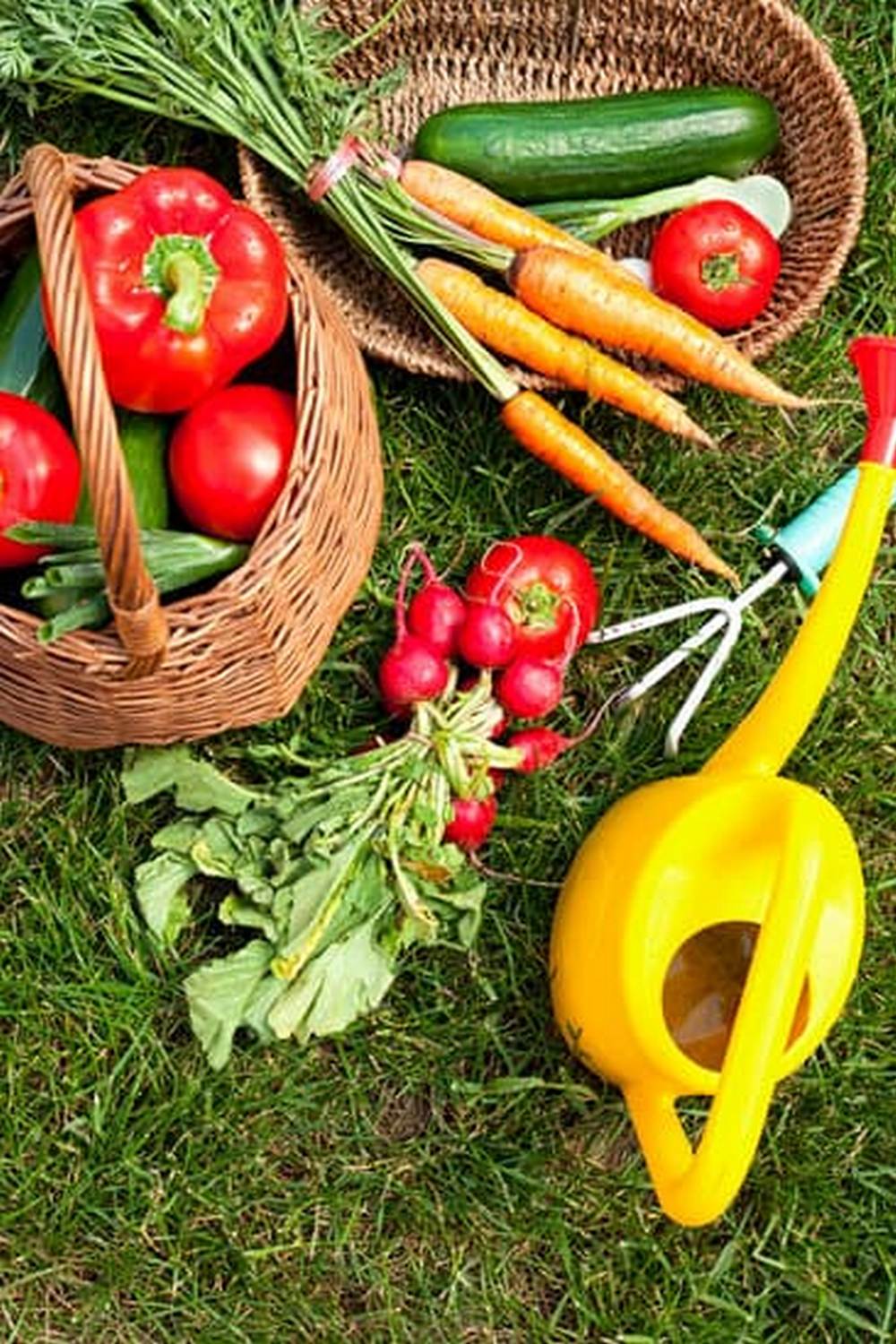Home vegetable gardens are a sanctuary for fresh produce, but they can also attract unwanted pests that threaten the health of your plants. In today’s eco-conscious world, the use of natural pesticides derived from plants has gained popularity among gardeners. These plants not only ward off pests but also promote a harmonious ecosystem within your garden. Understanding the significance of incorporating natural pesticides is crucial for sustainable gardening practices.
By utilizing plants that act as natural pesticides in your home vegetable garden, you can achieve a pest-free environment without the need for harmful chemicals. The benefits go beyond just protecting your crops; these plants contribute to biodiversity, support pollinators, and enhance the overall health of your garden ecosystem. From herbs to flowers and even certain vegetables, nature provides abundant options to keep pests at bay while promoting a thriving garden environment.
In this article, we will explore common pests in home vegetable gardens and the specific plants that repel them effectively. We will delve into the various types of plants – herbs, flowers, and vegetables – that can double up as natural pesticides.
Additionally, we will discuss tactics like companion planting and DIY pesticide recipes using plants from your garden to implement eco-friendly pest control methods seamlessly. Let’s embrace a more sustainable approach to pest management in our home vegetable gardens by harnessing the power of nature’s own remedies.
Benefits of Using Plants as Natural Pesticides in Vegetable Gardens
Using plants as natural pesticides in home vegetable gardens offers a multitude of benefits that not only promote a healthy and thriving garden but also contribute to a more sustainable and eco-friendly approach to pest control. One key advantage of utilizing plants as natural pesticides is the avoidance of harmful chemicals commonly found in synthetic pesticides.
By incorporating specific plants known for their pest-repelling properties, gardeners can protect their vegetables without risking any negative impacts on their health or the environment.
Enhancing Biodiversity
Another benefit of using plants as natural pesticides is the promotion of biodiversity within the garden ecosystem. Many plants that serve as natural pest deterrents attract beneficial insects such as ladybugs, lacewings, and parasitic wasps. These insects prey on common garden pests like aphids, caterpillars, and beetles, helping to maintain a balanced and diverse population of organisms in the garden. This natural predation can prevent pest outbreaks and reduce the need for additional intervention.
Cost-Effectiveness and Sustainability
Incorporating plants with pest-repelling properties into your vegetable garden can also help save money on expensive chemical pesticides while promoting sustainable gardening practices. Many of these natural pesticide plants are easy to grow from seeds or cuttings, requiring minimal maintenance and resources.
Additionally, by creating a self-sustaining ecosystem that relies on natural predators and repellents, gardeners can reduce their overall environmental impact and cultivate a more resilient garden that is less susceptible to pest damage in the long run.
Promoting Healthier Plants
Furthermore, using plants as natural pesticides can contribute to the overall health and vitality of your vegetable crops. Unlike synthetic chemicals that may have negative effects on plant growth or fruit development, natural pesticide plants provide a gentle yet effective form of protection against pests without compromising the well-being of your garden produce.
By harnessing the power of nature’s own defenses, you can ensure that your home vegetable garden thrives in a balanced and harmonious environment free from harmful toxins.
Common Pests in Home Vegetable Gardens and the Plants That Repel Them
One of the most common pests that plague home vegetable gardens are aphids. These tiny bugs can quickly multiply and wreak havoc on your plants. However, there are natural solutions to keep them at bay. Planting garlic, chives, or alliums near your vegetables can help repel aphids due to their strong scent. Additionally, marigolds are known for their ability to deter aphids while also adding a pop of color to your garden.
Another pest that often bothers gardeners is the tomato hornworm. These large caterpillars can decimate tomato plants if left unchecked. To naturally deter tomato hornworms, consider planting basil near your tomato plants. Basil not only acts as a natural pesticide against these pests but also enhances the flavor of your tomatoes when used together in recipes.
Slugs and snails are notorious for leaving behind a trail of destruction in vegetable gardens. To combat these slimy pests without resorting to harmful chemicals, try planting rosemary or thyme around your garden beds. These herbs have strong scents that slugs and snails find unpleasant, helping to protect your vegetables naturally.
| Common Pest | Plants That Repel Them |
|---|---|
| Aphids | Garlic, Chives, Alliums, Marigolds |
| Tomato Hornworms | Basil |
| Slugs and Snails | Rosemary, Thyme |
Herbs as Natural Pesticides
Herbs not only add flavor to your dishes but can also be a powerful weapon against pests in your home vegetable garden. Growing and utilizing herbs as natural pesticides can help protect your plants without the need for harsh chemicals. Herbs like basil, mint, and rosemary are known for their pest-repelling properties, making them a popular choice for eco-friendly gardeners.
Growing Herbs in Your Garden
When it comes to using herbs as natural pesticides, it’s important to know how to grow them effectively. Most herbs thrive in well-drained soil and require ample sunlight. You can either plant them in individual pots or incorporate them into your vegetable garden beds. Regular pruning and harvesting of herbs will not only promote growth but also release their aromatic oils that deter pests.
Utilizing Herbs as Natural Pesticides
There are several ways you can utilize herbs as natural pesticides in your garden. One common method is to make a herb-infused spray by steeping chopped fresh herbs in water overnight and then straining the mixture into a spray bottle. This homemade pesticide can be used to target specific pests or sprayed preventatively on your plants. Additionally, planting herbs like chives near vulnerable crops can act as a deterrent for pests due to their strong scent.
By incorporating herbs as natural pesticides in your home vegetable garden, you can create a balanced ecosystem that minimizes the use of harmful chemicals while still protecting your crops. Experimenting with different varieties of herbs and observing their effects on pest control can help you find the best natural solutions for your garden. With proper care and utilization of these herbal allies, you can enjoy healthier plants and a thriving garden environment.
Flowers That Act as Natural Pesticides
Flowers not only add beauty to your garden but can also serve as natural pesticides, protecting your home vegetable garden from common pests. By planting specific flowers strategically, you can create a vibrant and functional garden that thrives without the use of harmful chemicals. Here are some flowers commonly used as natural pesticides in home vegetable gardens:
- Marigolds: Known for their bright colors and ability to repel nematodes, aphids, and other pests, marigolds are a popular choice for companion planting in vegetable gardens. Plant them around the perimeter of your garden or between rows of vegetables to deter unwanted insects.
- Nasturtiums: These colorful flowers not only attract beneficial insects like ladybugs and hoverflies but also repel whiteflies, cucumber beetles, and squash bugs. Nasturtiums are easy to grow from seed and make a beautiful addition to any garden.
- Lavender: In addition to its pleasant aroma and soothing properties, lavender is known to repel fleas, moths, and mosquitoes. Planting lavender near your vegetable garden can help keep these pests at bay while adding a touch of elegance to your outdoor space.
By incorporating these natural pesticides into your garden design, you can create a balanced ecosystem that supports the health and growth of your vegetables. Not only do these flowers contribute to pest control, but they also attract pollinators like bees and butterflies, essential for fruit production in many vegetable plants. Consider planting a variety of these flowers throughout your garden to enjoy both their aesthetic appeal and functional benefits.
Vegetables That Double Up as Natural Pesticides
When it comes to maintaining a healthy and thriving vegetable garden, the use of natural pesticides is essential. One effective way to combat pests in your garden is by incorporating vegetables that not only serve as food but also act as natural pesticides. These multi-purpose plants not only help protect your crops but also provide you with fresh produce for your meals.
One such vegetable that doubles up as a natural pesticide is garlic. Garlic is known for its strong odor, which deters common garden pests such as aphids, spider mites, and cabbage loopers. Planting garlic around your vegetable garden or intercropping it with other plants can help keep these harmful insects at bay. Plus, you’ll have fresh garlic on hand for culinary use.
Another versatile vegetable that acts as a natural pesticide is hot peppers. The capsaicin in hot peppers not only gives them their spicy flavor but also serves as a natural insect repellent. By planting hot peppers like jalapenos or habaneros in your garden, you can protect your crops from pests like beetles and caterpillars.
You can even make a homemade pepper spray by blending hot peppers with water and using it to deter pests from your plants. By utilizing these vegetables that double up as natural pesticides, you can create a multi-purpose solution for pest control in your home vegetable garden.
How to Incorporate Companion Planting for Natural Pest Control in Home Vegetable Gardens
Companion planting is a traditional method that involves planting different crops in close proximity to each other to enhance growth, repel pests, and improve overall yield. By strategically combining plants in your vegetable garden, you can create a natural pest control system that reduces the need for harmful chemical pesticides. When selecting plants for companion planting, consider those that act as natural pesticides and deter common garden pests.
One effective way to incorporate companion planting for natural pest control in your home vegetable garden is by interplanting aromatic herbs such as basil, mint, and rosemary among your vegetables. These herbs not only emit strong scents that repel pests like aphids, beetles, and caterpillars but also attract beneficial insects like ladybugs and lacewings that feed on harmful pests.
Additionally, planting onions or garlic alongside your leafy greens can help deter pests while providing you with flavorful additions to your meals.
Another strategy for companion planting is creating physical barriers between plants susceptible to pests by interspersing them with natural pest-repelling flowers like marigolds or nasturtiums. Marigolds release compounds into the soil that repel nematodes, a common garden pest that damages root systems of plants.
Nasturtiums not only act as a trap crop for aphids but also attract predatory insects that feed on aphids and other harmful pests. By combining various plant species strategically in your vegetable garden, you can effectively control pests naturally while promoting biodiversity.
Moreover, rotating crops each season is essential in preventing the buildup of specific pests in your garden beds. Companion planting aids in this practice by disrupting the reproduction cycle of certain pests and creating a diverse ecosystem within your garden space. Embracing companion planting for natural pest control not only promotes sustainable gardening practices but also enhances the health and productivity of your home vegetable garden without relying on synthetic pesticides.
| Companion Plant | Pests Repelled |
|---|---|
| Basil | Aphids, beetles, caterpillars |
| Marigolds | Nematodes |
| Nasturtiums | Aphids & attracts predatory insects |
DIY Natural Pesticide Recipes Using Plants From Your Garden
Having a thriving vegetable garden is a rewarding experience, but it also comes with its own set of challenges, including pests that can harm your plants. Instead of resorting to chemical pesticides that can be harmful to the environment and your health, consider using plants that act as natural pesticides.
These plants not only help in controlling pests but also add beauty and functionality to your garden. Here are some DIY natural pesticide recipes using plants from your garden:
- Garlic Spray: Garlic is known for its strong scent and taste, which makes it an effective natural pesticide. To make garlic spray, simply blend a few cloves of garlic with water and strain the mixture. Dilute the liquid with more water and add a few drops of dish soap. This solution can repel aphids, caterpillars, and other common pests in your vegetable garden.
- Neem Oil Spray: Neem oil is derived from the seeds of the neem tree and is a powerful natural pesticide. It acts as an insect growth regulator and repels pests like whiteflies, aphids, and mites. To make neem oil spray, mix pure neem oil with water and a small amount of liquid soap. Spray this solution on your plants to keep pests at bay.
- Chrysanthemum Tea: Chrysanthemums contain pyrethrin, a compound that is toxic to insects but safe for humans and pets. To make chrysanthemum tea spray, steep dried chrysanthemum flowers in hot water for several hours. Strain the mixture and use it as a spray on your plants. This natural pesticide is effective against aphids, spider mites, and beetles.
By using these DIY natural pesticide recipes made from plants found in your own garden, you can effectively control pests while maintaining a healthy environment for yourself, your family, and beneficial insects in your vegetable garden. Consider incorporating these eco-friendly pest control methods into your gardening routine for a more sustainable approach to managing pests while promoting plant health and biodiversity.
Conclusion
In conclusion, incorporating plants used in home vegetable gardens that are natural pesticides not only helps to protect your crops from pests but also promotes a more sustainable and eco-friendly approach to gardening. By utilizing herbs, flowers, and even certain vegetables that repel common garden pests, you can create a natural barrier that minimizes the need for harsh chemical pesticides.
This approach not only benefits your garden but also contributes to the overall health of the environment by reducing the use of harmful substances.
Furthermore, embracing natural pest control methods in your home vegetable garden can lead to a healthier and more thriving ecosystem within your growing space. By encouraging beneficial insects and other organisms to thrive alongside your plants, you can create a balanced environment where natural predators keep pest populations in check. This holistic approach to pest management not only reduces the impact on the environment but also fosters a more resilient and self-sustaining garden over time.
Overall, by making use of plants that act as natural pesticides in your home vegetable garden, you can achieve a beautiful and bountiful harvest while promoting biodiversity and sustainability. Whether through companion planting, DIY natural pesticide recipes, or simply choosing crops that naturally deter pests, there are plenty of options available for creating a healthier and more environmentally friendly gardening experience.
So why not give it a try and see the positive impact that these natural pest control methods can have on both your garden and the world around you?
Frequently Asked Questions
What Is a Natural Pesticide for Vegetable Plants?
A natural pesticide for vegetable plants can be neem oil, which is derived from the seeds of the neem tree. It acts as a repellent and disrupts the feeding and reproductive processes of pests, helping to protect vegetable plants from damage.
What Plant Works as a Natural Pest Control?
Marigolds are known to work as natural pest control in gardens. They emit a scent that repels insects like aphids, mosquitoes, and nematodes, thus protecting nearby plants from potential damage caused by these pests.
What Herbs Keep Bugs Away From Vegetable Garden?
Some herbs that help keep bugs away from vegetable gardens include basil, mint, and chives. These herbs have strong scents that act as natural insect repellents, deterring pests from damaging the vegetables in your garden.

If you’re looking to get into vegetable gardening, or are just looking for some tips on how to make your current garden better, then you’ve come to the right place! My name is Ethel and I have been gardening for years. In this blog, I’m going to share with you some of my best tips on how to create a successful vegetable garden.





